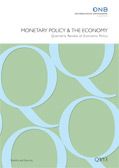Monetary Policy and the Economy Q3/15
 OeNB
OeNB
- published:
- September 2015.
 OeNB
OeNB
Monetary Policy and the Economy Q3/15 (PDF, 1.9 MB) September 2015.
Austria: Sluggish economic growth (PDF, 459 kB) Schneider. Schneider – Monetary Policy and the Economy Q3/15 Sep 30, 2015, 12:00:00 AM
Causes of declining investment activity in Austria
(PDF, 1 MB)
Fenz, Ragacs, Schneider, Vondra, Waschiczek.
Fenz, Ragacs, Schneider, Vondra, Waschiczek – Monetary Policy and the Economy Q3/15
Austria’s share of investment relative to GDP, which is high by international standards, dipped
significantly in recent years. This downtrend, which was also evident in peer economies, chiefly
reflected an adjustment process in a climate of weaker long-term growth. While the international
trend reversed in mid-2013, Austria’s investment share continued to decline. The
main reasons for Austrian companies’ current reluctance to invest can be traced back to
fragile
demand and deep uncertainty. Lack of access to finance is unlikely to have dampened
investment activity, as the higher level of internal financing has offset the diminishing importance
of bank loans. Although there is some evidence of banks tightening their lending
conditions,
this is unlikely to have led to credit rationing, as demand for bank loans has also
fallen off. Estimations based on a structural vector autoregressive (VAR) model also show that
loan supply shocks have only had a small negative impact on growth.
Austria, investment, business cycle, loan supply, credit crunch
E22, E32, E51
Sep 30, 2015, 12:00:00 AM
Expected retirement age and pension benefits in Austria: evidence from survey data
(PDF, 562 kB)
Knell, Segalla, Weber.
Knell, Segalla, Weber – Monetary Policy and the Economy Q3/15
In this paper we present evidence on Austrians’ expectations about their retirement age and
the size of their pension benefits. We find that young people expect to retire at an
older age compared to the actual age. The answers indicate that this increase in the expected
retirement age might be sufficient to counterbalance the forecasted rise in life expectancy
over the next decades. Furthermore,
the increase is also approximately in line with the
assumptions
that underlie official forecasts about the development of pension expenditures.
People in Austria also expect
to receive less pension benefits, i.e. they expect net replacement
rates to decrease, although in this case our results are less conclusive. In general, there exists
a considerable degree of uncertainty,
in particular among younger people. Furthermore, we
find that the main structure of the new pension account system does not seem to be well
understood.
This suggests that the rules of the new system could be better communicated (e.g.
via individualized pension account information).
pension system, retirement age, replacement rate, subjective expectations
J1, J26, H55, D84
Sep 30, 2015, 12:00:00 AM